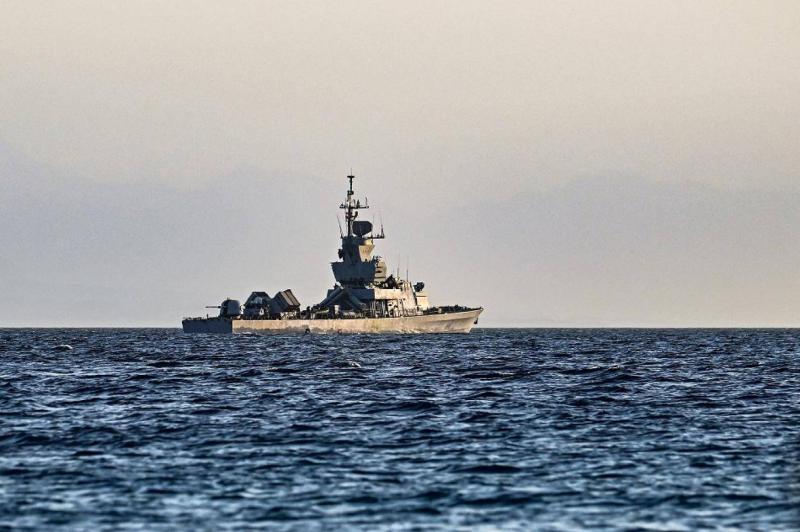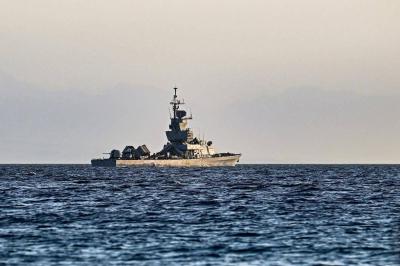The Houthis are intensifying their attacks on ships in the Red Sea, impacting a vital trade route between the East and West. In response, several shipping companies have instructed vessels to navigate instead around the southern tip of the African continent, the "Cape of Good Hope," a slower and consequently more expensive route. The United States and Britain have launched dozens of airstrikes against Houthi military targets in response to the attacks on ships, expanding the conflict in the region stemming from the Israeli war in Gaza.
Insurance sector sources have indicated that war risk premiums for shipments via the Red Sea are increasing following Houthi attacks, with expectations of targeting vessels associated with British or American affiliations. The London insurance market had already classified the southern Red Sea as a high-risk area, even prior to the recent Houthi assaults, necessitating that ships inform their insurance companies when navigating through these areas and pay additional premiums, which up until earlier this month were typically for a seven-day coverage period. Sources from the insurance sector revealed that war risk insurance premiums have risen to about 1% of a vessel's value, up from around 0.7% last week, with various discounts applied by insurance companies. They added that prices are expected to rise. This translates into hundreds of thousands of dollars in additional costs for a seven-day journey.
Monroe Anderson, Chief Operating Officer at Vessel Protect, a company specializing in marine war risk insurance and part of the Ben Insurance Company, noted that the durations for war risk quotes have now become much shorter, with "24 hours being the norm." He told Reuters, "Prices are increasing, reflecting a high and ambiguous exposure to risks in the Red Sea." He added, "Since the naval and aerial strikes in Yemen, it is now widely believed that, in addition to vessels linked to Israel, there is an increasing threat to ships associated with Britain and the United States, including their flags, as well as those linked to Australia, the Netherlands, Bahrain, and Canada." He pointed to the US-led naval coalition which is attempting to secure commercial shipping lanes.
An insurance sector source stated, "Houthi attacks apply to all ships, and their visibility standards have diminished... We now advise ships flying US and British flags against transiting through the Red Sea." In recent days, commercial vessels have halted their journeys through the Red Sea, with more ships opting for a longer journey around the Cape of Good Hope.
Here are the actions taken by various companies:
* **C.H. Robinson**
On December 22, the global logistics group stated it had rerouted over 25 vessels to sail around the Cape of Good Hope in the week prior, with this number likely to increase. It added, "Disruptions to port access or areas in ship routes and rising prices concerning many trade movements are expected to continue in Q1 2024.”
* **CMA-CGM**
The French shipping group said on January 5 it had not changed its previously announced plans to gradually increase the number of vessels transiting the Suez Canal. The group had rerouted several ships to take the Cape of Good Hope route.
* **Euronav**
The Belgian oil tanker company announced on December 18 it would avoid the Red Sea area until further notice.
* **Evergreen**
The Taiwanese container shipping company announced on December 18 that its vessels heading to Red Sea ports would sail to nearby safe waters pending further notice, and the routes of vessels scheduled to pass through the Red Sea would be altered to the Cape of Good Hope. The company also announced a temporary halt on accepting cargo from Israel.
* **Frontline**
The Norwegian oil tanker group stated on December 18 that its vessels would avoid passing through the Red Sea and the Gulf of Aden.
* **Graham Car Carriers**
The Norwegian car shipping company stated on December 21 that its vessels would not pass through the Red Sea.
* **Hafna**
The Norwegian shipping company announced on January 12 it had stopped all ships from heading to the Bab el-Mandeb Strait or sailing in its waters after a warning from the joint maritime forces urging avoidance of the area following US and British airstrikes in Yemen.
* **Hapag-Lloyd**
The German container shipping company announced on January 15 that it decided to continue rerouting ships away from the Suez Canal to the Cape of Good Hope and would issue further decisions on January 22. A company spokesperson regarding the US-British airstrikes said on January 12: "We will not comment on incidents that occurred last night," adding that Hapag-Lloyd welcomes measures aimed at securing safe passage for ships, as rerouting incurs tens of millions of euros in additional monthly costs.
* **HMM**
The South Korean container shipping company indicated on December 19 that it had ordered its vessels that typically use the Suez Canal to change course to the Cape of Good Hope.
* **Hog Autoliners**
The Norwegian shipping firm announced on December 20 it would stop transit of its vessels through the Red Sea after the Norwegian Maritime Authority raised the warning level for the southern region of the sea to the highest level.
* **Klaveness Combination Carriers**
The Norwegian tanker operator stated on December 28 that it was unlikely any of its vessels would sail in the Red Sea unless the situation improved.
* **Kuehne + Nagel**
Michael Aldwell, Vice President for Marine Logistics at the Swiss logistics firm, stated on January 12: "Even if the Bab el-Mandeb Strait becomes safe and secure for passage from today onward, we expect it will take at least two months before ships resume normal traffic patterns."
* **Maersk**
The Danish shipping group, which controls nearly a sixth of global container trade, announced on January 5 that it would halt the passage of its ships in the Red Sea "for the foreseeable future." Following the US and British strikes on Houthi military targets in Yemen, the company expressed hope on January 12 that international interventions and increased naval presence in the region would eventually restore maritime trade through the strait.
* **MSC**
The Mediterranean Shipping Company announced on December 16 that its vessels would not transit the Suez Canal and had already rerouted some to the Cape of Good Hope.
* **Nippon Yusen**
A spokesperson for Nippon Yusen, Japan's largest shipping company by sales, told Reuters on January 16 that the company had temporarily halted navigation through the Red Sea for all its operated vessels and had also directed ships near the Red Sea to wait in safe waters while considering the possibility of rerouting.
* **Ocean Network Express**
The joint venture between Mitsui O.S.K. Lines, Nippon Yusen, and Kawasaki Kisen Kaisha announced on December 19 that it decided to reroute ships away from the Red Sea to the Cape of Good Hope or temporarily suspend voyages and move to safe areas.
* **Orient Overseas Container Line**
The Hong Kong-based company stated on December 21 that it ordered its vessels to change their course or stop sailing to Red Sea waters. The company, owned by Orient Overseas (International) Limited, also ceased accepting cargo from and to Israel until further notice.
* **Tor**
The Danish tanker group announced on January 12 that it had decided to temporarily halt all crossings from the southern Red Sea for the time being.
* **Wallenius Wilhelmsen**
The Norwegian shipping group announced on December 19 that it would stop all of its voyages in the Red Sea until further notice, mentioning that rerouting ships to the Cape of Good Hope would extend travel times from one week to two weeks.
* **Yang Ming Marine Transport**
The Taiwanese container shipping company announced on December 18 that it would change the routes of vessels transiting the Red Sea and Gulf of Aden to navigate around Africa via the Cape of Good Hope over the next two weeks.
The Cape of Good Hope is considered a critical trade route and also serves as an alternative oil route in cases where the main channels of the Suez Canal or Bab el-Mandeb are closed, according to a report from "Business Insider." However, it differs from other shipping routes due to the high costs imposed by the longer distance that forces commercial ships to take to transit from Asia to Europe.
For instance, the journey from the Suez Canal in Egypt to Rotterdam in the Netherlands, Europe's largest port, takes about 11 days. In contrast, taking the "Cape of Good Hope" route requires at least 26 days, according to financial data companies like "Refinitiv."
Currently, after major companies have rerouted from the Suez Canal and the Red Sea towards the "Cape of Good Hope," they are facing huge increases in maritime shipping costs, as reported by a recent article on "The Loadstar," which specializes in maritime news. The site explains that rerouting from the Suez to the "Cape of Good Hope" could "add around 10 days to the westbound journey from Asia to Northern Europe." This would also "significantly strain already limited supplies ahead of the Chinese New Year and lead to higher shipping prices."
According to Peter Sand, chief analyst at the Xeneta Shipping Index, the cost of transporting goods could rise "significantly," warning in his remarks to the site: "Depending on the size and duration of any disruption in the Suez Canal, we could see shipping prices increase by as much as 100%." Sand pointed out the incident of the "Ever Given" in 2021, which blocked the Suez Canal for six days, causing major disruption, emphasizing that the aforementioned incident "left deep and frightening scars," which may be repeated at this time.




